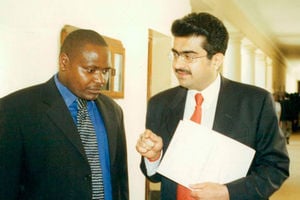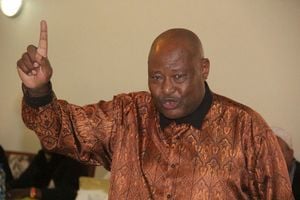
URP leaders during a meeting at Kasarani stadium in Nairobi on September 8,2016 when the party was dissolved ahead of the Jubilee Party merger.
When my colleagues and I came together to found United Republican Party (URP), it was important for us to come up with a name that reflected the core convictions of its founders – a name that spoke to Kenya’s great need for a unitary rather than fragmented nation.
Our view was that there were historical forces hell-bent on creating jimbos or a federalist system in Kenya to mirror the American form of governance. We did not have a problem with that; what we worried about was the desire by Kenya’s version of federalists to merge the American federalism with aspects of former USSR governance style – which was essentially an introduction of communism or socialism through the back door.
The word ‘united’ was intentionally added to the name of the party to bolster the sense that we were going to reach out to all communities, all races and all religious persuasions in the land. Ours was designed to be the party that would answer Kenya’s failure to heal ethnic wounds by creating a platform and blueprint that was welcoming, futuristic and practical. We were not saying that it was going to be easy, or Kenyans wouldn’t read mischief in our efforts, but that we were going to act in ways that inspired our fellow countrymen to reach out for the great possibilities our unity on offer.
As URP founding chairman, it fell upon me and other party luminaries to inspire the direction and scope of the party’s outreach initiatives. Together with William Ruto, Ali Chirau Mwakwere, Omingo Magara, Cyrus Jirongo and others, we set out to popularise and help Kenyans see in URP the party with the greatest chance of transforming lives by bringing all Kenyans under the banner of a common purpose. (Of these individuals, William Ruto went on to become Head of State, some 10 years after the demise of the URP).
The cynicism that had gripped the nation since the onset of pluralism about parties and politicians was something I did not want associated with our efforts. Ours had to be the party of hope, inspiration and possibilities. We were to become the bridge Kenyans crossed as the nation embraced the tantalising promises of the twenty-first century – the futuristic party that ushered Kenya into that milestone of her approaching jubilee.
As with all Kenyan political parties at their inception, we ran into issues of perception. There were those who saw the party as a Rift Valley outfit, others who saw it as a fallback plan for cynical schemers, and many who saw the party as a bargaining chip to be deployed at the right time.
Given the scepticism prevalent in Kenya about the duplicity of politicians and their reputation for personal greed, I couldn’t blame those who cast aspersions on our goals. What they were saying was – by your deeds, we shall know what you truly stand for. In my public life, I had stood for unity and pragmatism… I did not want the chairmanship of this party to erode the gains I had made in public trust. I was the people’s servant first and foremost.

Calming the Storms book by former Speaker of the National Assembly Francis Ole Kaparo as pictured on April 19, 2024.
To my delight, the party morphed into a major political force, spurred on by the working relationship forged between it and The National Alliance, the party led by Uhuru Kenyatta. The whole of Mandera became a URP zone. The party also featured in Wajir, Baringo, Narok, Turkana, Samburu, Busia, Tana and West Pokot. In all, we elected 67 parliamentarians or MPs, 11 senators, 10 governors and 400 MCAs. If the strength of a party was weighed in the numbers of elected officials it boasted, URP was well on its way to becoming a key player in shaping the core agenda of Kenya. And indeed it did!
Shortly before I teamed up with colleagues to found URP, we attempted to take over the United Democratic Movement, but we were stopped by the allies of Raila Odinga. By this time, I was still the chairman of Nema. Worried that time was running out on our team and that we could be locked out of participation in the coming elections, we registered the United Republican Party. Soon, thereafter, I resigned as the Nema chairman and devoted my full attention to party political matters.
Resignation from Nema was in keeping with what I had always done. I had resigned as Kanu branch secretary for Laikipia and as a member of the National Governing Council of the party when I was elected Speaker of the House. Later, I resigned from URP when I was appointed the chairman of the NCIC.
It was during the campaign season that we met for dinner at a friend’s place in Mombasa, and weighed our options in relation to the nature of the alliances we wanted to build. After vigorous discussions, it became evident that our issues were better addressed in a partnership with The National Alliance (TNA), one of the parties that came together to form the Jubilee coalition.
Though we were of the view that we were the kingmaker and would get either TNA or ODM elected, most members felt more comfortable with TNA and voted to lead URP in that direction. Consequently, committees were formed to harmonise the TNA and URP blueprints and come up with an outfit that reflected a merger.
It did not take long for the two parties to merge and come together under the banner of the Jubilee Alliance. I signed the agreement with the youthful Johnson Sakaja, chairman of TNA.
The merger ushered us into a new realm, where the core strengths and glaring weaknesses of the two parties had to be managed by a joint secretariat. One of the most challenging issues we faced was the International Criminal Court (ICC), which had implicated a number of Kenyans, including Uhuru Kenyatta and William Ruto, on charges of crimes against humanity. We were concerned that the Hague trials could reignite ethnic tensions at a time Kenyans had embraced unity and put the events of 2007/08 behind them.
I came to realise – from the word go – that running an alliance was not a joyful event.
Though we had signed an agreement, we ran into occasions where unanticipated situations caused us to look the other way as TNA or URP fielded candidates in areas the agreement stated otherwise. Political realism dictated that we couldn’t consider the agreement cast in stone.
At the core of this matter was the fact that political alliances in Kenya were not governed by ideologies, but by tribe, money, clan and sometimes religion and the sheer force of an individual’s personality.
As leaders of the alliance, we thus had to work tirelessly to ensure the outfit remained united and went on to achieve its goals.








